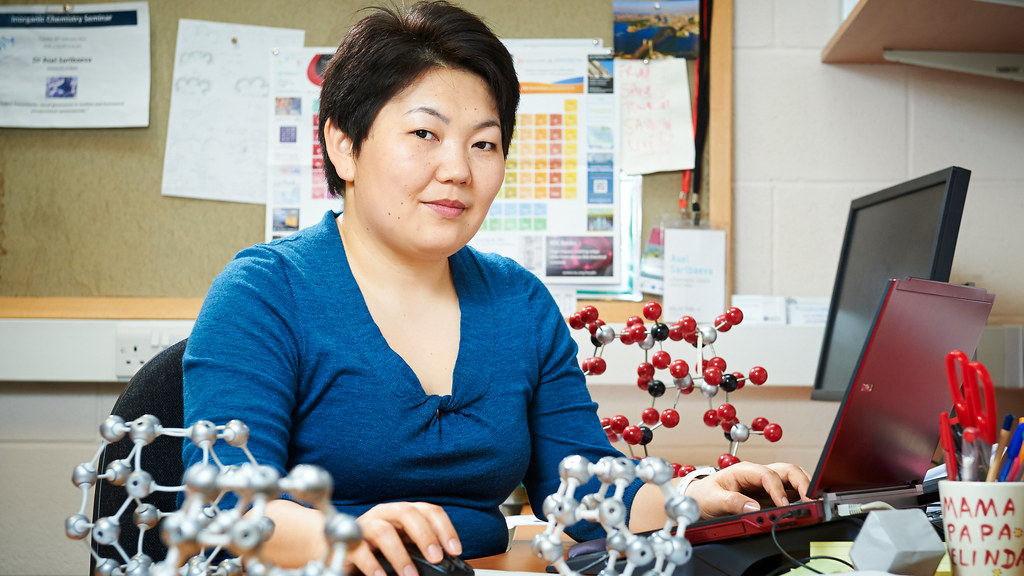Dr Asel Sartbaeva, researcher in Chemistry at the University of Bath, has been named 'woman of the year', scooping the top prize at the FDM everywoman in Technology Award for 2021.
The annual national awards programme, which is now in its 11th year, celebrates the most inspirational women working in STEM (science, technology, engineering and maths) industries, and pays tribute to their role in inspiring and supporting the next generation.
This year's award recognises Dr Sartbaeva’s groundbreaking invention of ensilication – a method for storing and transporting vaccines safely. Her technique protects vaccines from heat damage, so they can be safely stored and transported in all temperatures.
“My dream is for every child around the globe to receive safe childhood vaccinations, to be protected from diseases, and to eliminate and eradicate as many diseases as possible.” said Dr Sartbaeva. “My team and I believe ensilication is a truly viable technique for making this possible.”
Thermostable vaccines were named a priority research area in the World Health Organisation’s Global Vaccine Action Plan 2011-2020. The hope is for such vaccines to be reliably delivered to remote parts of the world where'cold chain' refrigeration is not possible. Currently, up to 50% of vaccine doses are discarded before use due to being stored at suboptimal temperatures, with millions of children around the world missing out on life-saving inoculations.
Ensilication ‘shrink-wraps’ vaccine proteins in position using layers of silica that build up into a cage around the molecules. This cage stops them unravelling when exposed to temperatures that would normally cause them to degrade. The proteins are held in place until it's time for them to be freed from their silica cages and delivered.
Last year, Dr Sartbaeva proved the worth of her thermostabilising technique in a real-life situation, when she sent both ensilicated and regular samples of the tetanus vaccine from Bath to Newcastle by ordinary post (a journey time of over 300 miles, which by post takes a day or two). When doses of the ensilicated vaccine were subsequently injected into mice, an immune response was triggered, showing the vaccine to be active. No immune response was detected in mice injected with unprotected doses of the vaccine, indicating the medicine had been damaged in transit.
Dr Sarbaeva says the FDM award is a victory to be shared. “I’m thrilled and humbled, and I'm happy to share this award with my whole team," she said. "This is a win not just for me, but for everyone working on developing this technology, including my colleagues and collaborators. Thank you all for contributing to the technology that can make such an important change in the future."
When Dr Sartbaeva is not involved in teaching or research, she finds time to promote science to children. She also regularly speaks about issues connected to women pursuing a career in science, academia, and the importance of mentoring for girls and young women starting out in their science careers. Last month, she was made a UNICEF Ambassador for the ‘Girls in Science’ programme in her home country of Kyrgyzstan.
Professor Ian White, Vice-Chancellor and President of the University of Bath, said: “This is a wonderful award which Asel deserves so much, and so I would like to offer my sincere congratulations. Asel is an inspiration, not just for her vital work as a scientist, but also for her work as a STEM role model. The University has a wonderful track record at the FDM awards, with our female academics having won prizes five times since 2016. I see this as a true reflection of the world-class science that is being led by women at Bath.”
Professor Carole Mundell, head of Astrophysics at the University of Bath and chair of the University’s Senior Academic Women’s Network, said: “Asel is an outstanding and inspiring scientist, innovator and influencer and tireless supporter of fellow women and girls in science and technology. Her novel vaccine encilication technology aims to tackle vaccine- preventable illness and deaths that impact the most vulnerable women and children in the poorest countries. I am delighted that she has been recognised through the award of the prestigious FDM everywoman in Technology Award 2021.”
Dr Andrew Burrows, head of Chemistry, added: “I am thrilled that Asel has been awarded the FDM everywoman in Technology Award. It is a fitting recognition of her work on ensilication, which has the potential to make a real impact in improving access to vaccines in less well developed parts of the world.”
The winners were announced at an online award ceremony last night (4 March 2021). Previous winners from the University of Bath include Professor Marcelle McManus in 2020, Dr Apala Majumdar in 2019, Professor Semali Perera in 2017 and Professor Carole Mundell, who was named Woman of the Year at the awards in 2016.
everywoman is a global platform dedicated to the empowerment of women in business. Working with companies and organisations, they support members’ professional development and offer mentorship opportunities and a networking forum for women.

